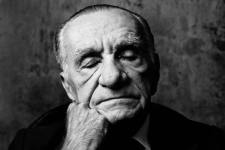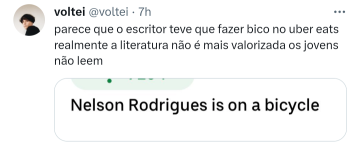You are using an out of date browser. It may not display this or other websites correctly.
You should upgrade or use an alternative browser.
You should upgrade or use an alternative browser.
Brazilian Literature
- Thread starter Eric
- Start date
Benny Profane
Well-known member
I never figure about it. Seeing again, yes, they seem brothers.I STILL think it's Golda Meir in her, ahem, "golden" years, ?
Verkhovensky
Well-known member
Looks like F. Murray Abraham to me.I STILL think it's Golda Meir in her, ahem, "golden" years, ?
Benny Profane
Well-known member
A counterpart about my city:As part of the New York Times continuing series from around the world, today's installment is:
Read Your Way Through Salvador
By Itamar Vieira Junior and translated by Johnny Lorenz
July 19, 2023
I was born in Salvador, in the Brazilian state of Bahia, and lived in the general vicinity until I reached the age of 15. But it was when I left that I really came to know my city. How was I able to discover more about my birthplace while traveling far from home? It might sound rather clichéd but, I assure you, literature made this possible: It took me on a journey, long and profound, back home, enveloping me in words and imagination.
A frequent visitor to public libraries, I discovered the books of Jorge Amado. I already knew something of Amado, not from reading him but because he was an omnipresent figure in the cultural life of Salvador. Stepping into the world of his novels began a great love affair, for two reasons: I experienced the power of writing in the hands of a capable narrator — one who captivates us and brings us to the heart of the story — and, later, I recognized myself as one of Amado’s protagonists, for his books are inhabited by the people of my community.
Salvador was the first capital of Brazil, founded in 1549 as part of the Portuguese colonial project in the Americas. In the Salvador of yesteryear, one would find Europeans, mostly Portuguese and Dutch, as well as Indigenous peoples, especially the Tupinambá. Many different ethnicities from Africa were also represented, such as the Yoruba, with roots in Nigeria, Benin (previously Dahomey) and Togo, as well as the Bantu people of the Republic of Congo and Angola. With spirit and creativity, the inheritors of the African diaspora — a large majority, since about 80 percent of the current population of Salvador self-identifies as Afro-Brazilian — fashioned the rich and beautiful cultural life of the city, making Salvador a living monument to African cultures in the Americas.
What should I read before I pack?
To understand the formation of our unique society and, consequently, the cityscape of Salvador, one should read, before anything else, “The Story of Rufino: Slavery, Freedom and Islam in the Black Atlantic,” by João José Reis, Flávio dos Santos Gomes and Marcus J.M. de Carvalho. Rufino was an alufá, or Muslim spiritual leader, born in the Oyo empire in present-day Nigeria and enslaved during his adolescence. “The Story of Rufino” is an epic tale, encapsulating the life of one man in search of freedom as well as the history of the development of Salvador itself, a place inextricably linked with the diaspora across the Black Atlantic.
Another book for which I have deep affection is “The City of Women,” by the American anthropologist Ruth Landes. It offers an intriguing perspective, focusing on matriarchal power in candomblé, an Afro-Brazilian sacred practice, and revealing how the social organization of its spiritual communities reverberates across the city.
What books or authors should I bring?
If you want to feel the intensity of life on the streets of Salvador, these two books, both by Amado, are indispensable: “Captains of the Sands” and “Dona Flor and Her Two Husbands.” The first is a coming-of-age story in which we follow a group of children and adolescents living on the streets and on the beaches around the Bay of All Saints. Written more than 80 years ago, the book was banned and even burned in the public square during the dictatorship of Getúlio Vargas in the first half of the 20th century. As a portrait of Salvador, it is still relevant and reveals our deep inequalities.
“Dona Flor and her Two Husbands” is one of Amado’s most popular novels, translated into more than 30 languages and adapted many times for theater, cinema and television. One of the most well-known adaptations is the film “Kiss Me Goodbye” (1982), directed by Robert Mulligan, for which Sally Field earned a Golden Globe nomination. The book is a kind of manifesto for a woman’s liberation. Dona Flor possesses great culinary talent and, oppressed by a patriarchal society, finds herself divided between two men, one being her deceased husband. While the novel captures the daily life of the city in the 1940s, it is also a wonderful guide to the cuisine of Salvador, with its African and Portuguese influences.
If I have no time for day trips, what books can take me out of the city instead?
I invite readers to travel into the interior of Brazil, many hours by car, from Salvador, to the region known as the Sertão, whose name translates loosely to “backwoods.” Two books can also transport you there, and they are sides of the same story: “Backlands: The Canudos Campaign,” by Euclides da Cunha, and “The War of the End of the World,” by Mario Vargas Llosa.
“Backlands” is one of the most important works in the history of Brazilian literature. It is a journalistic telling that introduces us not only to the brutal War of Canudos but also to the intriguing landscape of the Sertão, a place so full of contradictions. In his writing of the conflict, da Cunha tells the story of the genesis of the tough sertanejo: a mythic, cowboy-esque figure of the drought-stricken, lawless interior.
“The War of the End of the World” is an essential epic that amplifies the narrative of “Backlands,” bringing a more imaginative, creative aspect to the story of Antônio Conselheiro, the spiritual leader of a rebellion, and of the multitude that followed him to their deaths.
What books can take me behind closed doors and show me hidden facets of the city?
“Selling Black Brazil: Race, Nation and Visual Culture in Salvador, Bahia,” by Anadelia A. Romo, demolishes the myth of racial democracy in Brazil. It also reveals that, while Afro-Brazilian culture is often celebrated, the recognition has not led to substantive changes for the country’s Black population.
Which writer is everyone in town talking about?
They’re still talking about Amado, as well as João Ubaldo Ribeiro, but to my embarrassment — I’m painfully shy — they’ve been talking about me.
What literary names might I see on street signs, statues or monuments?
You’ll find statues of Amado and his wife, the writer and photographer Zélia Gattai, in the neighborhood of Rio Vermelho, where they lived, and there’s an avenue named after Amado as well. At the Porto da Barra, there’s a monument to the Austrian writer Stefan Zweig, who fell in love with Salvador. And the most famous public square in the city is named after an abolitionist poet of the 19th century: Antônio Frederico de Castro Alves.
What audiobooks would make for good company on walks?
After the Nobel Committee for Literature recognized Bob Dylan, the dividing line between music and literature became even more diluted, so I won’t indicate an audiobook, exactly, but an album by Caetano Veloso: “Transa,” which was recorded while he was living in exile in London and includes songs in English. Today, the album is considered a classic.
What’s a good place to curl up with a book on a day off?
Salvador is on a peninsula and has 31 miles of beaches, any of which could be the ideal place to do some reading while enjoying fresh coconut water beneath a beach umbrella. I’ve gone through so many books this way, burying my feet in the sand, when I’m not diving into the warm waters or simply feeling the ocean breeze, constant and refreshing.
What literary pilgrimage would you recommend? And which might be less known?
One cherished pilgrimage site is the Memorial a Casa do Rio Vermelho, where Amado and Gattai lived until their deaths. It’s a simple house, really, but still so inspiring for all the history it possesses.
A place less frequented, I believe, but one of my favorites, is Ribeira — a neighborhood blessed by the calm waters of the bay — which appears in Gilberto Gil’s song “Domingo No Parque.” There, you’ll find the city’s best ice cream, with flavors of tropical fruit like pitanga (Surinam cherry) and mangaba.
The flight from Salvador, a city withered by disease and disorder
The historic migration from Brazil’s interior cities to the coast is now in sharp reverse
 www.ft.com
www.ft.com
By the way, Rodrigo Cerqueira was my colleague in Faculty of Economics of Federal University of Bahia. He isn't a Demographer, but Economist.
He works in Institute of Research in Socioeconomics (Superintendência de Estudos Econômicos e Sociais) as chief of Social Account and Economics.
Addendum: A man who was involved in jobbery, assaults, robbery and many crimes was murdered in one of the most rush avenues of my city in this afternoon. Salvador is as violent as 80's Medelín.
Last edited:
Benny Profane
Well-known member
Cadernos de Literatura Brasileira disponíveis online - Blog do IMS
Os Cadernos de Literatura Brasileira começaram a ser produzidos pelo IMS em 1996, oferecendo volumes centrados em diversos autores fundamentais da nossa literatura. Em 16 anos, 27 CLBs foram impressos, apresentando ensaios, depoimentos, entrevistas, manuscritos inéditos e registros fotográficos...
blogdoims.com.br
Another great magazine about Brazilian Literature.
Leseratte
Well-known member
Thanks, Benny! They are wonderful and here one can read them for free!Cadernos de Literatura Brasileira disponíveis online - Blog do IMS
Os Cadernos de Literatura Brasileira começaram a ser produzidos pelo IMS em 1996, oferecendo volumes centrados em diversos autores fundamentais da nossa literatura. Em 16 anos, 27 CLBs foram impressos, apresentando ensaios, depoimentos, entrevistas, manuscritos inéditos e registros fotográficos...blogdoims.com.br
Another great magazine about Brazilian Literature.


